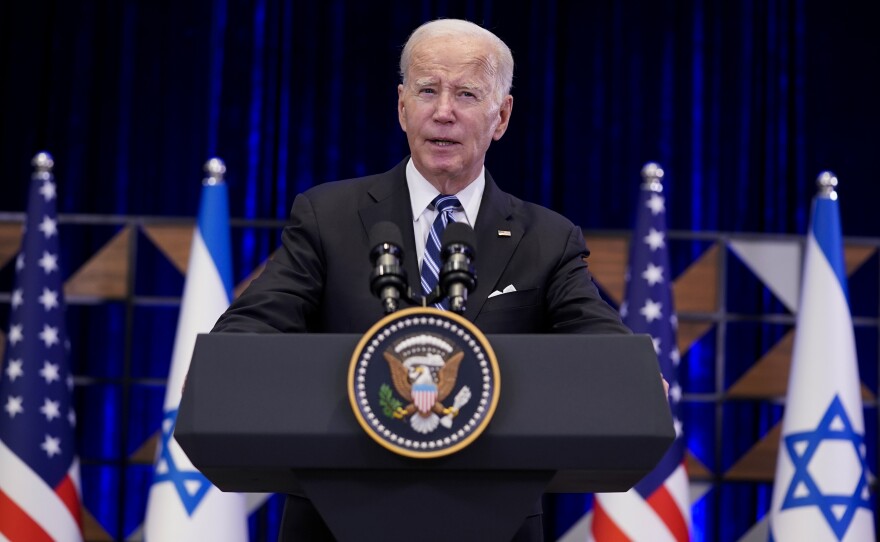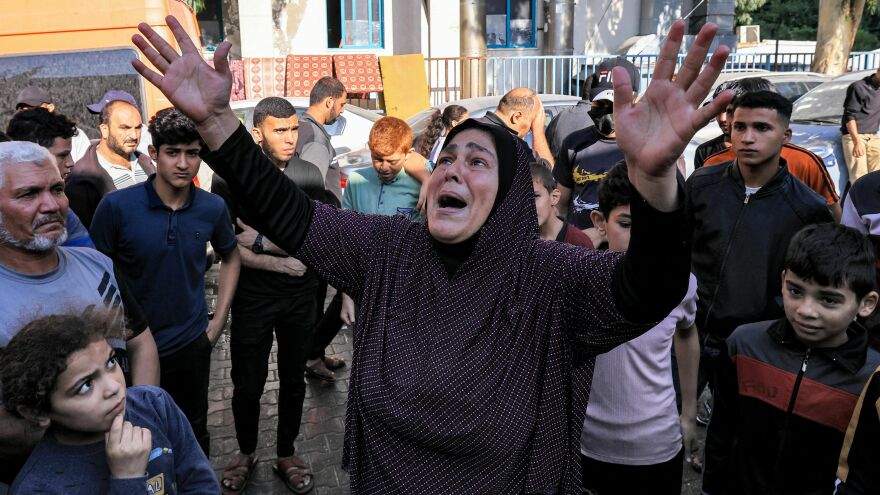Updated October 18, 2023 at 3:42 PM ET
President Biden's rare wartime visit to Israel on Wednesday marked his most forceful public show of support for the country, pledging unwavering commitment to its security and a promise for a congressional request for more defense funding, while simultaneously cautioning Israelis not to be consumed by rage.
Biden's visit appeared to yield some gains for the besieged Palestinians: Israel said it would allow food, water and medicine to reach the civilian population in the southern portion of the Gaza Strip.
The president's comments came amid concerns across the region that the volatility could spread to other Mideast countries as protests erupt in Iran, Jordan, Turkey, Morocco, Lebanon and Tunisia against Israel's bombardment and siege of Gaza.
Following the visit, the White House announced that Biden plans to deliver an Oval Office address on the Hamas attacks in Israel and Ukraine's fight against the Russian invasion on Thursday.
In a speech concluding the whirlwind trip, Biden slammed Hamas saying its attack on Israelis on Oct. 7 was similar to past terrorist attacks on the U.S.
Still, the president, who noted that the "vast majority of Palestinians are not Hamas," urged Israel not to let "shock, pain, rage" drive its quest for justice, advocating for a two-state solution to the conflict. "You can't look at what has happened here ... and not scream out for justice," he said.
"But I caution this: While you feel that rage, don't be consumed by it," he warned. "After 9/11, we were enraged in the United States. And while we sought justice and got justice, we also made mistakes."
The president's visit did not halt the violence in Israel or Gaza. Throughout the day Israel continued to launch airstrikes on Gaza, even as Biden met with grieving Israeli families from the Oct. 7 attacks that sparked the latest war.
Hamas, meanwhile, did not cease its launch of rockets at Israeli cities. Israel's Iron Dome defense system intercepts most. Air raid sirens are frequently heard in cities like Tel Aviv and Jerusalem.

Limited humanitarian aid to be delivered to the Gaza Strip
Biden's visit also yielded a conditional deal for humanitarian aid to besieged Palestinians who say they are slowly dying of thirst and are without medicine, electricity or enough food following a complete Israeli siege of Gaza.
On his way back to Washington, Biden told reporters that Egyptian President Abdel-Fattah el-Sisi has agreed to open up the Rafah gate — the border crossing along the Sinai Peninsula in Egypt — to allow up to 20 trucks of humanitarian aid into Gaza.
"They're gonna patch the roads, they have to fill in potholes to get these trucks through. And that's gonna occur," Biden said, noting it might take until Friday for the shipments to happen. He added that the first movement would be a small portion of the aid amassed at the border. The U.N. will distribute the material in Gaza, he said.
Biden told reporters that a key goal for his trip had been to get aid into Gaza as well as passage out for Americans wanting to leave — something he said he hopes will happen.
Earlier in the day, the Israeli government said it would allow only food, water and medicine to reach the civilian population in southern Gaza — not in the north were Palestinians have been ordered to evacuate. It did not indicate whether fuel would be allowed in to power hospital generators and Gaza's main power plant, which shut down last week.
Both Biden and the Israeli government said that if any aid reaches Hamas, the flow of aid into Gaza will be stopped.
Egypt has been trying to channel humanitarian relief to Gaza through the Rafah crossing, but aid has been piling up on the Egyptian side after Israeli bombardments made the crossing inoperable.
Tragedy at hospital precedes Biden's visit
Looming over the trip is worldwide outrage over a catastrophic explosion at a hospital in the Gaza Strip on Tuesday that killed hundreds of people, including scores of children.
Al-Ahli Baptist Hospital in Gaza City, where Israel's military had ordered a complete evacuation of its residents, was being used as a shelter by displaced families with nowhere else to go.
Grim images depicting children's bodies and bloodied, limbless women and men spread across social media and Arabic satellite TV channels, sparking protests across the Middle East from Morocco to Iran, and even within the U.S. Capitol on Wednesday.
Israel and the Palestinians have traded blame for the blast; Hamas claims it was a deliberate Israeli airstrike, a charge the Israeli military has vehemently denied. Israel says that a Palestinian rocket, launched by a Palestinian militant group, exploded in mid-air and fell on the hospital grounds.
Shortly after arriving in Tel Aviv, Biden told Prime Minister Netanyahu that it appears as though the strike against the hospital "was done by the other team, not by you." When was asked by reporters what made him confident in accepting Israel's explanation that it was not behind the hospital explosion. He replied: "The data I was shown by my defense department."
Hours later, a National Security Council spokesperson reiterated that the U.S. believes Israel is not to blame, based on analysis of "overhead imagery, intercepts and open-source information."
Hamas and the Palestinian Islamic Jihad group in Gaza say the attack was carried out by an Israeli warplane. Arab governments, including Egypt, Saudi Arabia and the UAE also blame Israel.
The blast and the protests it has sparked mark a dramatic turn in the 12-daylong war that began when Hamas fighters from the Gaza Strip broke through its barrier with Israel and killed 1,400 people in Israel and took some 200 people hostage. Entire Israeli communities in the south were destroyed in the assault.
Since those attacks, nearly 3,500 people in Gaza, a third of them children, have been killed by Israeli bombardment, according to the Palestinian Health Ministry. More than 12,000 people have been wounded. Those casualty figures do not include the victims of the Al Ahli hospital blast.
Another 1,300 people across Gaza are missing, presumed dead or still alive under the rubble of thousands of homes that have been destroyed.
Meanwhile, Israel has called up hundreds of thousands of reservists, who are now poised at its border with Gaza for a possible ground offensive.

Regional tensions flare
The Biden administration has been attempting to prevent the violence from spreading to the other parts of the region, but a meeting that was scheduled in Jordan with Biden and the leaders of Jordan, Egypt and the Palestinian Authority was cancelled by Arab leaders almost immediately after the carnage at the hospital.
The summit was meant to focus on efforts to get humanitarian aid for civilians in Gaza, and safe passage out for Americans in the conflict zone.
The White House said the president looks "forward to consulting in person with these leaders soon, and agreed to remain regularly and directly engaged with each of them over the coming days."
Hamas has seized on the devastation caused by the explosion at the hospital calling on Muslims and Arabs across the world to rally against Israel. It said the massacre "exposes the American and Western support for this criminal occupation."
Demonstrations have erupted across the Mideast, including in Egypt, Jordan, Iraq and Lebanon. There were also large protests in Turkey and Iran. Across the region and in the West, protesters are calling for the end of the attacks on Palestinians in the Gaza Strip.
In many neighborhoods in the West Bank, including Ramallah, Nablus and Hebron, Palestinians took to the streets. Some reportedly threw rocks at Israeli security in the West Bank.
Reuters reported that Israeli forces shot two Palestinian teens dead near Ramallah during those protests.
The U.S. embassy in Beirut issued a warning Wednesday telling U.S. citizens there to avoid the Awkar area "given the potential for further demonstrations." The embassy remained open but the State Department updated its travel advisory for Lebanon to a Level 4: Do Not Travel.
"The Department of State urges U.S. citizens in Lebanon to make plans to depart as soon as possible while commercial options are still available," the agency said.
In Washington, American Jewish organizations and protesters gathered at the Capitol on Wednesday criticizing the Israeli government and demanding a ceasefire.
An estimated 300 people were arrested during a demonstration in the Capitol's rotunda, the U.S. Capitol Police told NPR, and three were charged with assaulting police officers.
Egypt warns of regional chaos if war isn't contained
Reports emerged that Israel's ambassador to Egypt was leaving the country as tensions spike. When Israel's foreign ministry was asked about this, an official simply replied with "no comment".
Egypt's President Abdel-Fattah el-Sissi said Wednesday that any notion or idea that Palestinians in the Gaza Strip could be pushed or relocated to Egyptian territory is dangerous.
"The whole idea is that moving Palestinians to Sinai is simply moving the idea of resistance, the idea of killing, to Sinai," he said. "And then Sinai becomes a base for operations against Israel."
He said this could quickly spiral and pull Egypt and Israel into conflict.
Any attempt to displace Palestinians in the Gaza Strip could also lead to Palestinians in the West Bank being pushed into Jordan, el-Sissi said in opening remarks for a joint press conference with German Chancellor Olaf Scholz in Cairo on Wednesday.
El-Sissi said if that happens, the creation of a Palestinian state wouldn't be possible because there would be land but no people.
"I warn against this scenario," he said.

People remain trapped in Gaza, awaiting aid from outside
In Gaza City, which falls under Israel's evacuation notice, many people simply cannot leave or refuse to, citing the lack of safety anywhere in Gaza.
Medical student Tasneen Ahl's home in Gaza City has already been destroyed in this war. She and dozens of family members, including 10 children, remain the city, though. She says her family isn't leaving because hundreds of people have been killed in the south after evacuating there.
A U.N. shelter where thousands of Palestinians were seeking refuge was also struck by Israel on Tuesday, killing six people, according to the U.N. agency for Palestinian refugees.
"There's no place here in Gaza we can go. We can't. We can't leave our home," Ahl told NPR.
The U.N. relief works agency, OCHA, says every person in Gaza is estimated to have less than a gallon of water for all their needs per day, including for drinking, hygiene and cooking. That's in part because water and sanitation facilities have been severely damaged.
Ahl says the last time she drank a sip of water was over 24 hours ago. Ahl says her father walked over a mile to source flour for bread. The family is cooking on woodfire because of power outages.
"I can't see my family like this. We are dying slowly," she said, before adding the are "no human rights" for people in Gaza.
NPR staffers Aya Batrawy reported from Jerusalem, Bill Chappell reported from Washington, D.C., Jaclyn Diaz contributed reporting from Washington D.C., and Ruth Sherlock contributed reporting from Tel Aviv, Israel.
Copyright 2023 NPR. To see more, visit https://www.npr.org.




